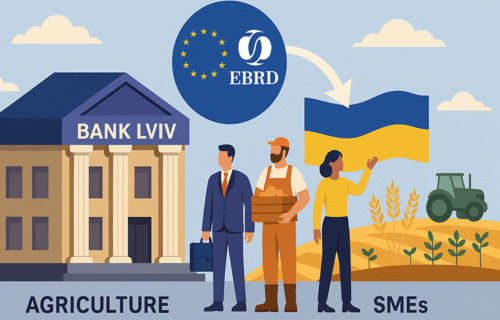The European Bank for Reconstruction and Development (EBRD) has approved a new €45 million risk-sharing facility with Bank Lviv to support private enterprises in Ukraine, helping sustain key industries and livelihoods during wartime.
The initiative, structured as an unfunded risk-sharing agreement, will allow Bank Lviv to issue new loans to local businesses while the EBRD absorbs part of the potential credit risk. The goal is to help small and medium-sized enterprises (SMEs) maintain operations, safeguard jobs, and invest in sustainable technologies despite ongoing economic disruption.
The facility combines two complementary components. The first, amounting to €36 million, falls under the Resilience and Livelihoods Guarantee — a product designed to keep essential sectors such as agriculture, logistics, food production and retail functioning. The second, worth €9 million, is part of the EU4Business-EBRD Credit Line, which provides incentive-based financing for small businesses investing in technology upgrades, energy efficiency and alignment with European standards.
Together, these mechanisms will enable Bank Lviv to extend new credit to local companies at a time when commercial financing remains constrained. The EBRD’s share of risk is estimated at €31.5 million, with additional donor support providing first-loss protection for defaulted loans.
Bank Lviv, headquartered in western Ukraine, focuses on SME lending and operates a network of 20 branches. As of mid-2025, it manages assets of roughly €333 million and a loan book of €212 million, primarily serving smaller regional firms.
The partnership with the EBRD will allow the bank to continue lending despite heightened risks and reduced collateral availability across Ukraine’s business sector. The arrangement also aims to preserve organisational capacity and employment within client companies, which have faced extensive disruption since the start of the conflict.
Half of the EBRD’s contribution under the facility is classified as green financing, supporting investments that reduce emissions or improve energy efficiency. The programme has been assessed as consistent with the goals of the Paris Agreement, with counterparties committing to low-carbon transition principles and the underlying sub-loans screened for climate-related objectives.
The EBRD confirmed that Bank Lviv meets the institution’s environmental and social risk-management standards. The bank will continue to report annually on its compliance and maintain oversight of environmental performance across its lending portfolio.
The project carries a strong transition impact score under the EBRD’s evaluation system, reflecting its contribution to resilience, inclusion and competitiveness. By sharing risk and expanding credit to smaller businesses, the facility is expected to sustain production capacity, support rural and agricultural value chains, and strengthen Ukraine’s private-sector recovery.
Once operational, the programme will be among the EBRD’s key financing tools for Ukraine’s wartime economy — combining immediate liquidity support with long-term goals for green and inclusive growth.
Source: EBRD
